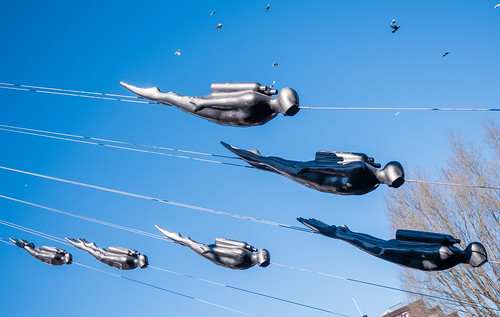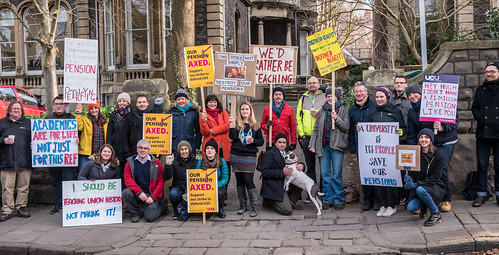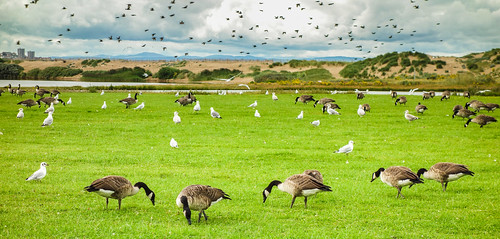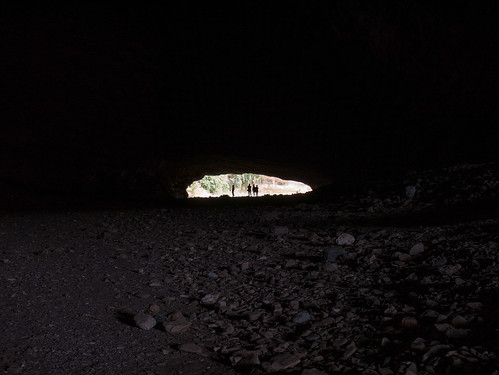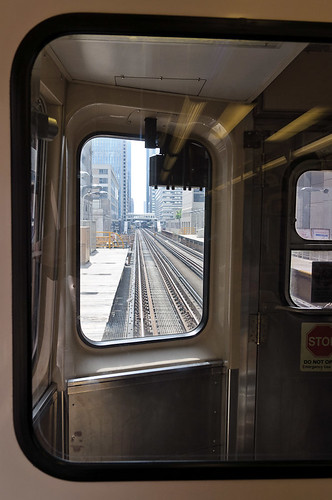Posts by author:
Chris Bertram
During the past term, I was on strike for fourteen days and I’m now on “action short of a strike” and, like my colleagues up and down the UK, I’m waiting to vote in a consultative e-ballot next week that may determine whether we reach a settlement with the employers and go back to work. But this post isn’t about the rights and wrongs of the dispute, it is about what it has felt like to be on strike — the highs and the lows — and about how the shared desire for a better university that has emerged from our unity and solidarity may be helped or hindered by how the strike is resolved and by the stories we tell ourselves about it.
A big part of striking (at least for those who choose not to sit at home) is picketing. I’ve been on picket lines (a long time ago) where the purpose of picketing was to stop people from going to work, but our picket lines now have been more symbolic and demonstrative. They’ve been about standing together, feeling a sense of comradeship, and sharing jokes and conversation. In this we’ve been joined by many of our students, giving rise to a renewed feeling of the university as an intellectual community bringing together teaching and research staff, other university staff and students and joining us together across disciplinary boundaries. This experience, together with associated demonstrations, teach-ins lunches, coffees and social events, has been the source of a growing sense of collective determination that a different kind of university is possible and that we mustn’t go back to the normality of submission to bullying micromanagement, the obsessive chasing of metrics and rankings and individualized anxiety and self-loathing.
[click to continue…]
I spoke yesterday at the Oxford Literary Festival in debate with Sunday Times journalist Sarah Baxter on the theme “Is there too much immigration?” Something like the following constituted my opening remarks.
The title of this panel asks whether there is too much immigration? I’m inclined to wonder whether this question is simply a mistake. My own focus in a forthcoming book [Do States Have the Right to Exclude Immigrants?](http://politybooks.com/bookdetail/?isbn=9781509521951) is not so much on whether immigration is good or bad for the country, but on whether states have the rights that politicians, pundits and journalists simply assume that they do, to regulate migration according to whether it is good or bad for the economy, strains public services, makes some people better off or worse off, and so on.
My book is a work in political philosophy rather than an intervention in current debates (though it can’t help being that to some extent). Let me just sketch the main argument and then I’ll get on to some further remarks about our current predicament. States are compulsory and coercive bodies. Legitimate states use that coercive force to limit the freedom of people subject to them. But there’s normally a quid pro quo involved: the state limits our freedom but also protects us from the threat that we, as individuals, pose to one another’s freedom. This tradeoff provides us with reasons to comply with the state’s authority. But unlike resident citizens would-be immigrants get all of the coercion with none of the protection. The world is divided into many states, some of which do a much better job for their subjects than others. And mobility is something that human beings have practised since forever. To make the regulation of migration legitimate, states ought to comply with principles that ought to be acceptable to everyone. Insofar as such principles don’t exist, legitimate states need to be working towards creating them (just as they regulate other areas of international life).
[click to continue…]
Photography can’t always be about aesthetics. As [Miriam posted about the other day](https://crookedtimber.org/2018/03/05/44049/), academics and many academic-related staff in the UK are currently on strike in defence of our pensions which are under threat from a plan to shift all the risk from institutions to individuals and to leave us thousands of pounds worse off in our retirement. It is a considerable achievement for managers paid vast sums of money on account of their managerial abilities to have engineered a situation where their staff vote 9:1 for strike action. Anyway, it has, so far been a determined and somewhat joyful action in which we have rediscovered what we have in common. However this ends (and the signs are good) the atmosphere in our workplaces will have changed forever. People really are really missing their students, teaching, and research and are loving the support and solidarity we’ve had from our students. But I doubt that bullying micromanagement will be as passively accepted in the future as it has been in the past.
Ingrid [wrote a post about academics writing “trade” books](https://crookedtimber.org/2018/01/27/academics-writing-trade-books-what-should-they-know/). I’m not all that keen on such categorizations, but the idea seems to be that these are books that are and aim to be accessible to a wider, non-academic, public. In the past, of course, may scholarly works by academics have spoken to such wider publics, and some still do. To give some examples from off the top of my head E.P. Thompson’s *The Making of the English Working Class*, Barrington Moore’s *The Social Origins of Dictatorship and Democracy*, Bernard Williams’s *Ethics and the Limits of Philosophy*, and John Mackie’s *Ethics: Inventing Right and Wrong*, were all works of scholarship and rigour that were sold to and were read by people other than specialists with academic jobs. In my own area, political philosophy, one could argue that taking seriously one’s democratic commitments even requires that arguments are shareable with an educated public (as [I argued long ago](http://www.journals.uchicago.edu/doi/abs/10.1086/233760?journalCode=et) … ironically behind an academic paywall).
More mysterious to me is the continued existence of *purely* “academic” books, written for specialists by specialists. Except for those written by a few megastars or academics with crossover into nearby disciplines, there are few purely academic volumes that are likely to sell enough copies to be commercially viable at the price they need to break even. So why do they continue to exist as bound paper entities (which is what I’m talking about) ? Two reasons, I guess. First, we continue to supply them and tenure and promotions committees continue to be impressed by them (so they are a professional necessity in many fields), and second the demand for them is heavily subsidized by buyers such as university libraries (presumably libraries are the only purchasers of many of the theses that publishers like Routledge recycle into books). None of this is necessary any more for intellectual exchange and argument. Exactly the same content (too rigourous or dull for the lay reader) could be supplied at the same length free of charge and online. Only prestige and subsidy is keeping purely academic books alive.
FT Alphaville [has a really insightful interview with Jarrett Walker](https://ftalphaville.ft.com/2018/01/26/2198114/a-conversation-about-how-public-transport-really-works/) on public transport, cities, space, geometry and elite projection. The pleasure of reading this is the one you get when you encounter someone who is really smart, who knows some really detailed empirical stuff, who is not a “theorist” in an academic sense, but who can illuminate things about the world in a way that good theory sometimes can. The basic messages: that getting people from A to B ultimately involves dealing with physical space and you can’t change that; that cities have to work for everyone in order to work for anyone (because even if you are privileged you still need the underlings you depend on to turn up); and that elites tend to project fantasy solutions without considering how untypical they are of the general population. There’s bonus discussion of Elon Musk towards the end, which underlines a point Harry made in comments on my Smith post, namely that the entitled wealthy are the real snowflakes who are very resistant indeed to people challenging their opinions and preconceptions. Read the whole thing.
